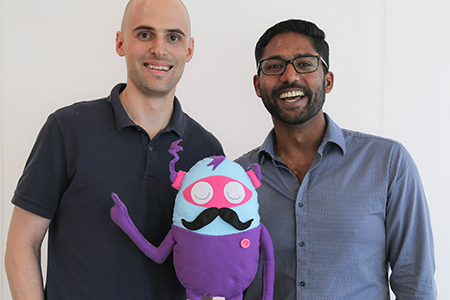Stories
Innovative System from Stanford Biodesign Fellows Helps Parents and Children Say Goodnight To Sleep Terrors

Andy Rink and Varun Boriah of the Lully team.
The Biodesign Innovation Fellowship enables post-graduate trainees in medicine and engineering to work together in multi-disciplinary teams. Their charge is to identify compelling unmet medical needs, develop innovative heath technologies to address them and learn to navigate the complex business and regulatory environment required to deliver these solutions to patients. Andy Rink, a surgical resident in the fellowship, had personal experience with sleep/night terrors, first with his own sister, and later with a young nephew. He and another fellow, Varun Boriah, an engineer and former CEO of a blood diagnostics company, teamed up to understand and address this troubling condition.
Children suffering from night terrors seem to wake suddenly in distress, crying and extremely upset. They are usually unresponsive to attempts of comfort because they are not truly awake, and caregivers must standby helplessly while the night terror runs its course. Episodes typically last ten to twenty minutes, and while children don’t usually remember them the next day, the repeated awakenings are emotionally stressful and physically exhausting for parents. Night terrors can also be dangerous to children if they fall out of bed or injure themselves. Yet there are no credible solutions to address them. As Rink explained, “While training to be a physician, I was taught that night terrors were ‘no big deal’ and they would ‘go away on their own.’ However, after seeing my sister and then nephew go through them first hand, I learned they are in fact a huge deal for the entire family.” These episodes occur most often in young children, and are estimated to affect one in five families.
After conducting a deep investigation of sleep disorders and sleep patterns, Rink and Boriah seized the opportunity to leverage an established technique called scheduled awakening. The technique had been demonstrated to prevent night terrors by partially waking the child just before the unhealthy part of the sleep cycle in which the event occurs. Unlike nightmares, which occur in the REM cycle of sleep, night terrors occur in the first part of the sleep cycle.
Based on user research, Varun and Boriah evolved their concept from a wearable device to one placed under the child’s mattress. The device uses precisely timed vibrations to partially wake the child and prevent the night terror from occurring. To time the intervention, the two Biodesign Innovation Fellows created a smart algorithm that learns the child’s sleep patterns and notifies parents when to turn the device on, which they can do via a Smartphone app. The interruption occurs only once per night and lasts for three minutes or less, yet was shown to be extremely effective in preventing night terrors in a preliminary study.
Rink and Boriah worked closely with Stanford School of Medicine sleep researchers Christian Guilleminault, a professor of psychiatry and behavioral sciences, and Shannon Sullivan, a clinical assistant professor of psychiatry and behavioral sciences to plan and conduct their study. Encouraged by the positive outcomes, they founded a company called Lully to bring the technology into patient care. Roughly a year later, Lully began shipping the Sleep Guardian system, first through its own website and now on Amazon. To date, the Sleep Guardian has helped thousands of patients and has been scientifically shown to prevent 90 percent of night terrors. Customer feedback attests to the product’s impact:
“Lully has totally changed our lives... I have my nights back! I have my own bed back! I have a rested child! And the whole family sleeps better. Lully truly is our sleep guardian. Thank you SO MUCH for such an awesome product.” – Andrew House, Lully customer from Amazon.com
